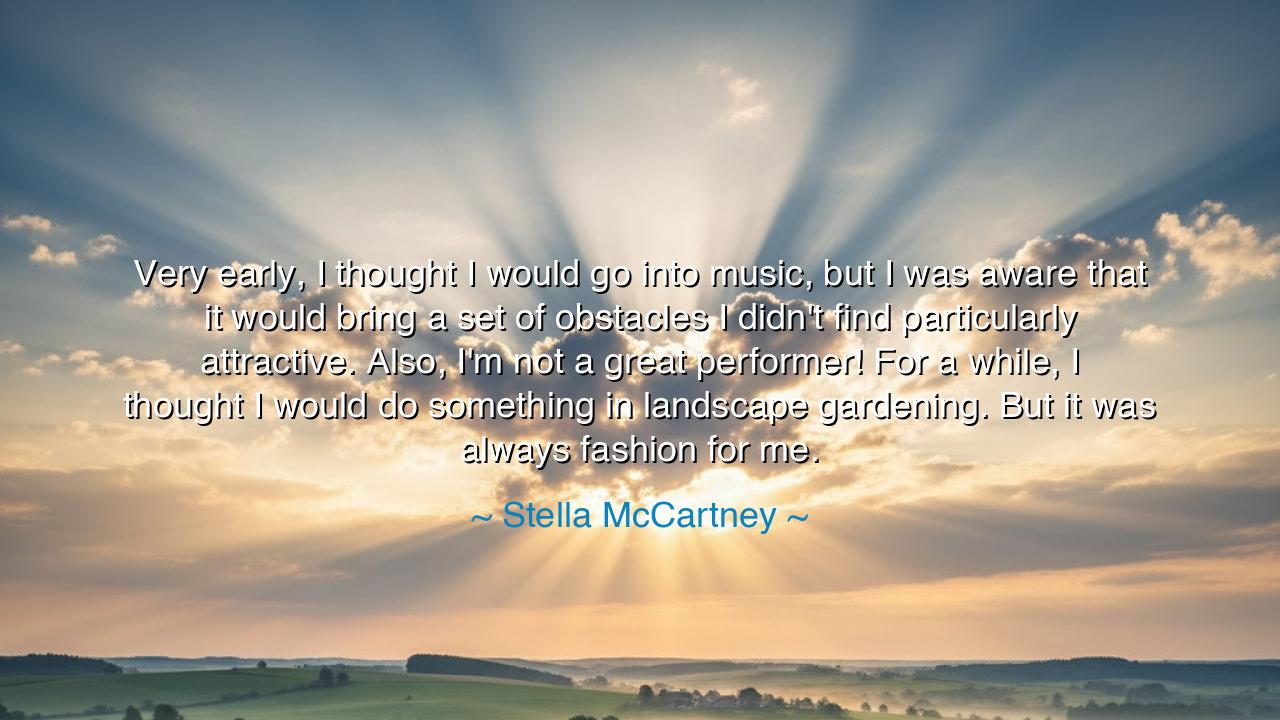
Very early, I thought I would go into music, but I was aware that
Very early, I thought I would go into music, but I was aware that it would bring a set of obstacles I didn't find particularly attractive. Also, I'm not a great performer! For a while, I thought I would do something in landscape gardening. But it was always fashion for me.






In the early stages of life, we are often faced with the eternal question: What shall I become? It is a question that resonates with the deepest part of our being, and like a river that winds its way through the landscape, we search for the path that feels most true to us. Stella McCartney reflects upon this journey, saying, “Very early, I thought I would go into music, but I was aware that it would bring a set of obstacles I didn’t find particularly attractive. Also, I’m not a great performer! For a while, I thought I would do something in landscape gardening. But it was always fashion for me.” In these words, she unveils the wisdom of self-awareness, the courage to recognize the paths that call to us, and the understanding that we must choose not only with our talents but also with our heart.
To seek a life that resonates with us is an ancient endeavor. The philosophers of old, such as Plato and Aristotle, taught that the soul must be aligned with its true purpose in order to live a virtuous and fulfilled life. Socrates, in his wisdom, often emphasized that to know oneself was the highest form of wisdom. It is not in the external world, not in the applause of others, that we find our worth, but in the quiet knowing of our own truth. McCartney’s reflection on the obstacles that music would have brought her, and the realization that fashion was her true calling, mirrors this ancient wisdom: that we must listen not to the noise of the world but to the whisper of our soul, which guides us toward the path that feels authentic.
The ancient world also recognized that talent is not enough on its own. Perseverance, and the willingness to face obstacles, were paramount. When McCartney mentions the “obstacles” in music, she speaks to the challenges that many artists and performers face in their pursuit. The great musician Ludwig van Beethoven understood this struggle. Born with hearing loss, he continued to compose some of the most profound music in history, despite the immense obstacles he faced. Beethoven did not allow the limitations of his body to deter his spirit. Yet, for others, like McCartney, recognizing where their strengths lie can be an act of wisdom. To move forward with a clear purpose is not just about persistence, but about choosing the path that aligns with our deepest passion.
McCartney’s contemplation of landscape gardening is another fascinating insight into the way we seek our place in the world. Like the great philosophers and poets of the ancient world, who often took refuge in nature for solace and reflection, McCartney’s consideration of gardening reveals a desire to connect with the earth. The ancient Romans, for instance, understood the importance of the garden as a space for both physical and mental nourishment. The famous gardens of Pompeii were not just a place to grow food, but a space to reflect, to connect with nature, and to find peace amidst the busy world. Though McCartney ultimately chose the world of fashion, the very idea of connecting with nature—whether through gardening or other pursuits—reminds us of the ancient wisdom that the land itself holds healing and inspiration.
However, fashion, as McCartney admits, was always her true calling. Fashion, like art, is a reflection of both the external world and the inner self. The great fashion designers of the past, like Coco Chanel, understood that fashion was not just about clothing, but about empowerment and expression. Chanel once said, “Fashion is not something that exists in dresses only. Fashion is in the sky, in the street, fashion has to do with ideas, the way we live, what is happening.” McCartney, in her own unique way, carries this vision forward. Her designs are not just clothing, but a representation of identity, values, and connection. She speaks to a deeper truth that transcends mere fabric—it is about creating a story with what we wear, crafting a vision that embodies our inner truth and outward presence.
In McCartney’s journey, we find an important lesson in clarity of purpose. It is not the obstacles we face that define us, but how we choose to navigate them. Self-awareness—understanding our strengths and limitations—is the key to living a life aligned with our true essence. Just as the ancients spoke of the importance of living in accordance with one’s nature, McCartney’s choice to follow the path of fashion over music or gardening is an expression of this deeper wisdom. She teaches us that while we may explore many avenues, it is the authenticity of our choices that brings the deepest satisfaction and the most meaningful success.
So, take heed of McCartney’s words as a guide for your own journey. Recognize the obstacles that lie before you, but do not be afraid of them. Understand that your true path may not always be the most straightforward or the one that others expect of you. Listen to the whisper of your heart, and choose the calling that resonates most deeply with your inner self. Just as McCartney found her passion in fashion, so too will you find yours—through self-awareness, through trial, and through the courage to follow the truth within you. The ancients knew that living a life of virtue meant living a life in harmony with one’s own nature. In doing so, we find our place in the world, and in that place, we thrive.






AAdministratorAdministrator
Welcome, honored guests. Please leave a comment, we will respond soon